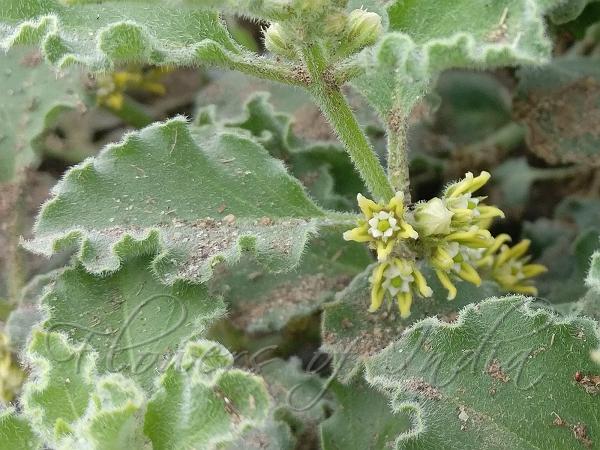|
| Desert Swallow-Wort |
|

|

| File size | 595959 |
| Original date | 8/15/19 9:45 AM |
| Resolution | 4640 x 3480 |
| Flash | Flash did not fire, auto |
| Focal length | 4.26mm |
| Exposure time | 1/309s |
| Aperture | 2.0 |
| Focus Distance | |
| Metering Mode | Spot |
| Camera make | OnePlus |
| Camera model | ONEPLUS A3003 |
| Sensor type | OneChipColorArea |
|
|
|
|
Photo: |
Botanical name: Cynanchum registanense Family: Apocynaceae (Oleander family)
Synonyms: Cynanchum varians, Glossonema varians, Glossonema edule
Synonyms: Cynanchum varians, Glossonema varians, Glossonema edule
Desert Swallow-Wort is a perennial herb 8-20 cm tall,
branches velvet-hairy. The species name registanense comes from
the Urdu word ray-gi-staan, meaning desert, as this is a desert plant.
Leaves are fleshy, 2.5-7 x 1.8-5 cm, lower
rotund ovate, somewhat heart-shaped, blunt or flat, upper elliptic
tapering, margin slightly to strongly wavy; leaf-stalk 6-22 mm long.
Flowers are borne in nearly stalkless, umbel-like, 2-8 flowered cymes,
fragrant. Flowers are white to yellow, 6-7 mm long, hairless, petals
3-5 mm long, blunt. Flower-stalks are short, sepal-cup hairy, divided
almost to the base, sepals 3.4 mm long, linear pointed. Corona lobes
are about 2.5 mm long, entire or bifid. Fruits are 2.5-5 cm long,
ellipsoid, covered with spine-like objects and minutely gray-hairy.
Seeds are 4-6.6 mm long, broadly ovate, pointed, flat with papery
margin, coma 1.2-1.3 cm long, white. Fruits, called Khiroli in
Rajasthan, are eaten raw. Desert Swallow-Wort is found in the desert or
dry shrubland, from Arabian Peninsula to NW India.
Medicinal uses: The fruits are used by
traditional people in Rajasthan as tonic and energy promoter. The
fruits are also used as medicine by local people of Thar in general
fatigue, cough and throat infections.
The fruits are used by
traditional people in Rajasthan as tonic and energy promoter. The
fruits are also used as medicine by local people of Thar in general
fatigue, cough and throat infections.
Medicinal uses:
 The fruits are used by
traditional people in Rajasthan as tonic and energy promoter. The
fruits are also used as medicine by local people of Thar in general
fatigue, cough and throat infections.
The fruits are used by
traditional people in Rajasthan as tonic and energy promoter. The
fruits are also used as medicine by local people of Thar in general
fatigue, cough and throat infections. | Identification credit: Sarman Ratiya | Photographed in Jaru, Anjar, Kutch, Gujarat. |
• Is this flower misidentified? If yes,